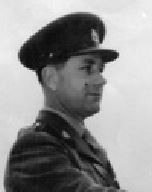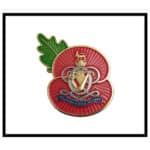Douglas Messenger began his varied and most successful career as a sea-faring man and served three years as a Tramp Steamer apprentice Officer, proving himself to be a fine helmsman.

For his war service, he switched to the Army and fought with distinction in the 2nd Reconnaissance Regiment in the Burma campaign. Apart from other engagements he took part in the desperate battle of Kohima. Yet he was reticent about his wartime achievements.
He did not join The 4th Hussars until 1948 and left in 1957.
His service with the Regiment was therefore relatively short, but during this service ability, commitments and leadership of a very special order won the admiration, loyalty and affection of all ranks under his command.
In 1948, The 4th Hussars were stationed at Colchester and were engaged in building up to full strength for deployment to Malaya where the so-called Emergency was threatening the security of that country. George Kidston was commanding and he appointed Douglas as Adjutant – a position for which his calm manner, fluency with pen, sense of humour and tolerance of the Army’s sometimes bizarre idiosyncrasies particularly suited him.
He continued in this post during the first eighteen months or so of our time in Malaya, and then in late 1949 assumed command of HQ Squadron. By this time Richard Close-Smith had taken over from George Kidston and Douglas sometimes found it difficult to see eye to eye with the Colonel as to the need for highly polished boots, when the priorities seemed rather be skilful jungle patrolling and marksmanship of a high order.
After The 4th Hussars returned from Malaya in 1951, Douglas went to the Staff College and served on the staff until returning to the Regiment, now stationed at Hohne, in 1955 when he took over command of ‘C’ Squadron.
He was a benevolent Squadron leader, much admired and liked by his subordinates, and he endeared himself to the Regiment as a whole by his regular contributions to the Regimental Journal of witty, topical articles entitled “Cornet Mustard Reports”, which were invariably submissions to the Commanding Officer, or some other authority, explaining or excusing some neglect or derogation of duty and demanding some restorative action or acknowledgement by the said authority, which would confirm his – Cornet Mustard’s – untarnished reputation and integrity.
Rodney Martin, who was one of Douglas’s troop leaders, together with other household names – Sandys, Hanna, Donavon, Williams, Clements, reinforced by Captains Fearfield and Sutro – writes: ‘Douglas himself has described his two years commanding ‘C’ Squadron as the happiest of his military life’.
A soldier’s worth can as a rule be more accurately gauged by what his subordinates thought of him rather than by hearing his superiors’ views. By this criterion, Douglas Messenger scores well. ‘We troop leaders’, observed Rodney Martin, ‘were properly respectful and afeard of Douglas’s stern eye on occasions but all ranks came to have a soft spot for him as a great and good man and a skilled, professional Squadron leader – a much-loved helmsman and a true friend’.
After further service on the staff, Douglas left the Army in 1960 and then displayed his versatility and grasp of business affairs by undertaking a variety of positions in civilian life – Beechams, the wine trade and as Comptroller of Lord de Lisle’s estates.
Douglas had married his lovely and charming wife Barbara in 1946. Alas, she succumbed relatively young to cancer, and a second marriage was not a happy one, leading to Douglas’s ill-health and incapacity.
Douglas’s devotion to The 4th Hussars never wavered and he was a most enthusiastic supporter of the annual 4th Hussar dinners, held in the Cavalry and Guards Club from the 1990s onwards.
For those fortunate enough to have served with him, he will be remembered for his quiet efficiency, his steady loyalty, his kindly leadership, his sense of humour, his delightfully witty pen and his humanity.
Whilst he was by no means a typical cavalryman, he was a great 4th Hussar.



